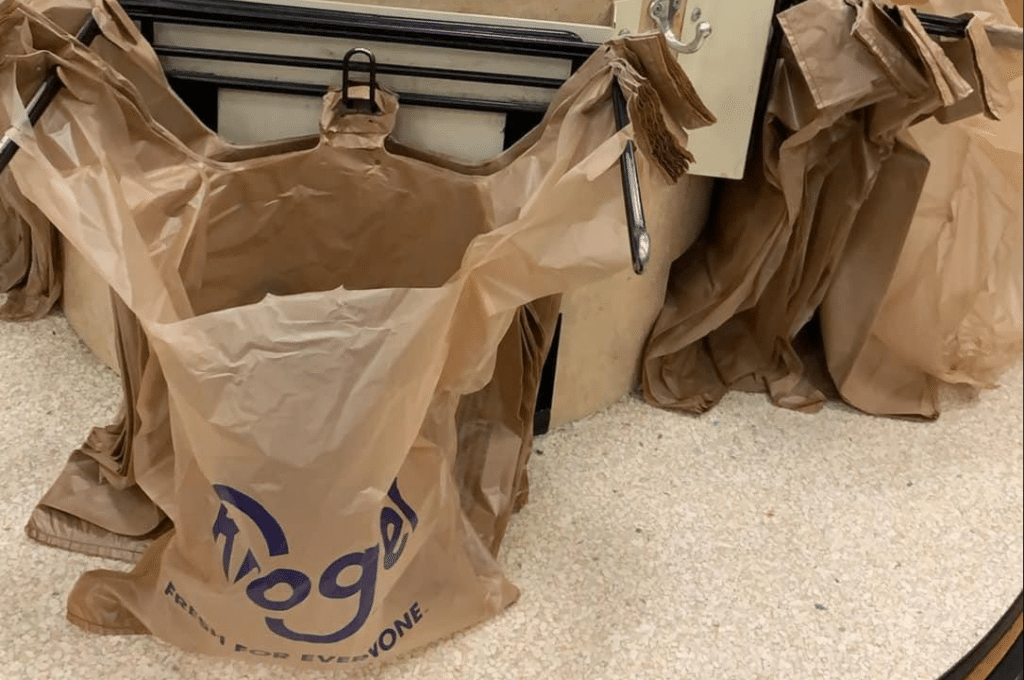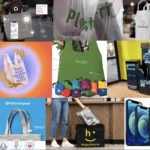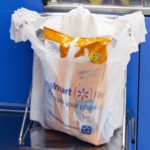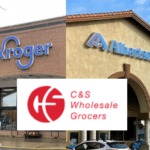
2025 seemed waaay off in the far distant future, when Kroger announced plans in 2018 to phase out single-use plastic bags in all of its more than 2,700 grocery stores.
But now, 2025 is well underway. So how’s that plastic bag plan going?
Despite Kroger’s earnest hopes and a seven-year head start, it turns out the plan is now on indefinite hold.
Up until about a year ago, Kroger said it was still progressing toward its goal. But its recently-released annual Environmental, Social & Governance (ESG) report acknowledges that it’s not going to happen this year – and maybe not ever.
“So far, more than 700 Kroger-operated stores have stopped providing single-use plastic shopping bags and offer only paper or multi-use plastic bags as alternatives,” Kroger’s report proclaimed. But that’s only about a quarter of all Kroger-owned stores – and most are in places where local or state laws already prohibit single-use plastic bags, so Kroger doesn’t have a choice. Kroger’s more proactive effort to replace its thin plastic bags with paper or reusable bags in the rest of its stores has hit some stumbling blocks.
“During the past two years, our Retail Operations team has conducted multiple pilots in select stores to test bag alternatives and incentives to encourage customers to move away from single-use plastic bags,” a portion of Kroger’s ESG report reads. “These tests have provided valuable insights and wide-ranging customer feedback that is affecting our pace of change and potential roadmap for phasing out single-use bags.”
“Wide-ranging customer feedback” – otherwise known as, shoppers hated the “alternatives” and wanted their plastic bags back?
Kroger also finds itself having to navigate and comply with a host of often confusing and contradictory laws across the country. “Differences in state and local bag requirements, bag bans, or bans on bag bans further complicate this work to find scalable solutions to reduce single-use plastic bags,” its report went on.
A dozen states and hundreds of local communities have passed legislation prohibiting retail stores and restaurants from providing single-use plastic bags. But 20 states have gone the opposite direction by banning bans – prohibiting any local jurisdiction within the state from enacting any prohibition on plastic bags.
That, plus the “wide-ranging customer feedback” Kroger received, has apparently turned what was once a lofty goal into something of a pipe dream.
It’s a far cry from 2018, when Kroger first announced its goal. “Our customers have told us it makes no sense to have so much plastic only to be used once before being discarded. And they’re exactly right,” Kroger CEO Rodney McMullen said at the time. “As America’s largest grocer, we recognize we have a responsibility to cut down on unnecessary plastic waste that contributes to litter, harms the environment and, in some cases, can endanger wildlife.”
Kroger’s Seattle-based chain QFC was the first to make the move away from single-use plastic bags in 2019, replacing them in all of its stores. Just a year later, though, Washington state passed a statewide ban, so it turned out the change at QFC wasn’t altruistic so much as it was pre-emptive. The same is true with Kroger-owned Ralphs and Food 4 Less stores in California, King Soopers in Colorado and Fred Meyer in Washington and Oregon, where statewide plastic bag bans are also now in place.
By Kroger’s own count, it operates 625 stores in those states alone. So its statement that “more than 700 Kroger-operated stores have stopped providing single-use plastic shopping bags” is mostly due to laws forcing it to do so, not as part of its voluntary effort.
So Kroger’s goal of eliminating plastic grocery bags across the entire company is far from becoming reality any time soon. But Kroger insists it isn’t giving up. “We remain focused on finding feasible ways to reduce the amount of single-use plastic grocery shopping bags used in our stores,” its report reads. “We continue to explore how to achieve progress on this challenging topic across the company and in collaboration with others.”
In announcing the company’s goal back in 2018, McMullen said the 2025 target date was meant to give “our customers plenty of time to adapt to a new way of shopping,” since “such a major change cannot happen overnight.”
Now, due to a number of unforeseen challenges, Kroger is finding that such a major change apparently can’t happen in seven years either.
Image source: Reddit/xjayyylinaaax










